Get to know the people behind the badge. In this member spotlight series, campus public safety professionals share their career journeys, personal perspectives, and professional insights. From training and development to ethics, philosophy, and reflections on the field, these profiles offer a candid look at the experiences that shape our community.
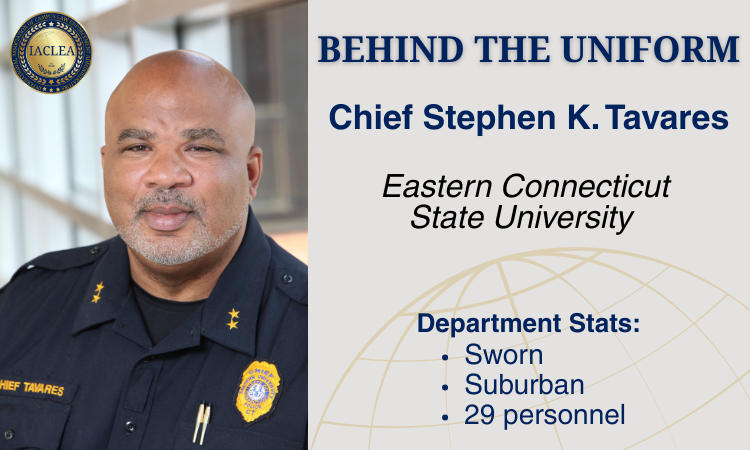
Chief Stephen K. Tavares – Eastern Connecticut State University
Chief Stephen K. Tavares’s career in campus law enforcement and public safety reflects a lifelong commitment to service, relationship-building, and the belief that higher education must remain a safe and supportive environment for learning and growth. A graduate of Eastern Connecticut State University, Chief Tavares returned to lead the very campus community that helped shape his professional journey, bringing with him more than three decades of law enforcement experience, leadership, and a people-centered approach to public safety.
Chief Tavares began his career at the Bristol, Connecticut Police Department, where he advanced through progressively responsible roles—including detective, sergeant, lieutenant, and deputy chief—over a span of more than 30 years. Throughout his tenure, he sought out assignments that broadened his perspective and strengthened his leadership, including community policing, narcotics task force operations, K-9 handling, and crisis negotiation. These diverse experiences reinforced his belief that effective public safety requires a balance of operational excellence, proactive problem-solving, and compassion.
Returning to Eastern Connecticut State University as Chief of Police allowed Chief Tavares to apply his extensive operational and supervisory background to a campus environment where collaboration and trust are critical. He leads with a community-centric philosophy, prioritizing engagement with students, faculty, and staff through visibility and listening. He works closely with campus partners (Student Affairs, Counseling, and Residence Life) as well as municipal agencies and community organizations to ensure a holistic and coordinated approach to safety and well-being.
Chief Tavares’s leadership is guided by three core values: integrity, excellence, and compassion. He emphasizes transparency and accountability in all operations, holding himself and his team to high professional standards. He ensures continuous training, policy review, and mentorship to maintain best practices and adaptability in a changing safety landscape. A trauma-informed approach and focus on de-escalation underscore his belief that public safety must be principled, professional, and people-centered.
To support these goals, Chief Tavares has pursued advanced training in leadership, command operations, and emergency management. He is a graduate of the University of Louisville’s Southern Police Institute Command Officers Development Course and the FBI National Command Course. He has completed FEMA emergency management programs—including Multi-Hazard Emergency Management for Higher Education—and numerous IACLEA trainings, including the annual conference, where he engages with peers across the country to exchange best practices and innovative strategies.
Chief Tavares’s dedication to ethical leadership and community engagement has been recognized at both the state and local level. He was named to the NAACP’s list of 25 Most Influential African Americans in Bristol, Connecticut, honored among the 100 Men of Color in 2022, and received the Police Commissioners Association of Connecticut Distinguished Chief’s Award the same year. These honors reflect a career built on trust, mentorship, and partnerships that extend beyond traditional policing to include advocacy, inclusion, and service to others.
Outside of his professional responsibilities, Chief Tavares values time with family and friends and maintains routines that promote balance and well-being. He recognizes the importance of self-care in sustaining the energy and focus required to lead a public safety department that supports a vibrant campus community.
For Chief Tavares, serving at Eastern Connecticut State University represents the culmination of his career experience and personal dedication to making a difference. His leadership ensures that safety, equity, and opportunity are at the forefront of the university experience, empowering students, faculty, and staff to thrive in an environment built on trust, respect, and shared responsibility.
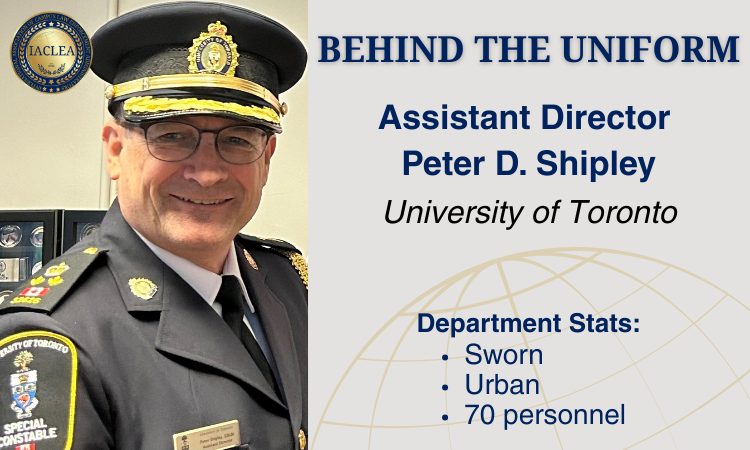
Assistant Director Peter Shipley – University of Toronto
With nearly 40 years in law enforcement, Assistant Director Peter Shipley has built a career defined by continuous learning, evidence-based training, and a steadfast commitment to community service.
Throughout his career, Assistant Director Shipley has held roles as Fitness Coordinator, Instructor, Facilitator, Special Constable, Use of Force Instructor, and Instructor Trainer. One of his most impactful contributions was serving as Chief Instructor of the General Patrol Training Unit at the Ontario Provincial Police Academy—the second-largest police agency in Canada. There, he created a research-driven and evidence-based approach to professionalizing training, establishing the Strategic Research, Planning, and Curriculum Design Unit, and leading initiatives in online learning, curriculum innovation, and leadership development.
His leadership extended to national and international associations, including serving as International Chair and General Chair of the State and Provincial Police Academy Directors Section (SPPADS) through the International Association of Chiefs of Police (IACP), and as President of both the Canadian Association of Police Educators and the Police Fitness Personnel of Ontario. These roles provided opportunities to collaborate with exemplary law enforcement leaders to elevate training standards and improve programs across North America.
At the University of Toronto, Assistant Director Shipley’s dedication extends beyond operational excellence to celebrating the outstanding contributions of his team. Through programs like True Blue, which allows staff recognition at all levels, and awards such as the Service Excellence Award and the King Charles III Coronation Medal, Assistant Director Shipley ensures that the achievements of frontline and leadership personnel alike are acknowledged and celebrated.
Recognizing the critical role of communications operators and frontline officers, Assistant Director Shipley emphasizes that law enforcement’s core mission is to serve the community—whether through investigations, crime prevention, or ensuring the safety and well-being of all campus members.
Training remains a cornerstone of his leadership philosophy. Under the guidance of Director Michael Munroe, officers are encouraged to attend conferences, seminars, and specialized programs—not only to grow professionally but also to bring back insights and best practices to share with their peers.
Reflecting on his career, Assistant Director Shipley credits the mentors and colleagues who believed in him and supported his vision for more progressive, adult-learning-based approaches to law enforcement education. Initiatives like personalized learning modules, introduced under his leadership, demonstrated the value of trust in officers to identify areas for growth—showing that confidence and capability come from continuous learning.
Assistant Director Shipley acknowledges that policing has faced heightened scrutiny in recent years, and he believes the profession’s future depends on maintaining integrity, professionalism, and accountability at every level. He emphasizes the importance of strong, principled leaders who uphold rigorous training and selection standards, noting that reducing requirements—particularly physical readiness—would not only be dangerous but negligent. Throughout his teaching and leadership roles, he has reinforced a simple but enduring philosophy: excellence in policing is defined by how you look, how you act, and how you treat people.
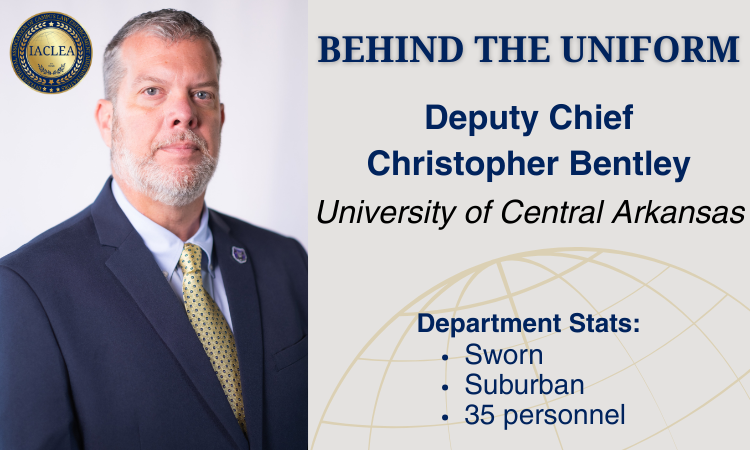
Deputy Chief Christopher Bentley – University of Central Arkansas
When Deputy Chief Christopher Bentley first set out on his career path, law enforcement wasn’t in the plan. His original dream was to become an educator and serve as a band director. But growing up in a family of first responders—a grandfather who was a police officer and a father who was a firefighter—quietly shaped the direction his life would eventually take.
His first taste of campus law enforcement came as a student worker at the University of Central Arkansas, where he embraced the principles of Community-Oriented Policing and found deep fulfillment in serving others. A pivotal influence along the way was his former Chief who showed him how campus policing is central to supporting students, faculty, and staff. That lesson has guided him throughout his 31 years in campus law enforcement, including 28 years in full-time service.
Deputy Chief Bentley’s career path has been marked by steady growth and achievement. From his early roles as a student worker and dispatcher, to completing the Arkansas Law Enforcement Training Academy in 2000, he worked his way through the ranks of officer, sergeant, lieutenant, captain, and now deputy chief. In September 2025, he will be sworn in as President of the Arkansas Association of Chiefs of Police—another milestone in a career built on service, leadership, and perseverance.
Education has also been a cornerstone of his journey. After stepping away from college in 1997 to take a full-time position, he returned years later to complete his Bachelor of Business Administration in 2015 and a Master of Business Administration in 2020. He is also a graduate of the Arkansas Leader program, an FBI Command College, and in 2019 became the first Certified Clery Compliance Officer in Arkansas.
In his current role, Deputy Chief Bentley oversees critical aspects of campus safety—from reviewing police reports for accuracy and compliance, to managing a network of more than 2,000 security cameras, to ensuring national best practices are reflected in department policies. Yet, he says, some of the most important work is less about systems and more about presence: being available for staff, mentoring team members, and building trust with students, faculty, and staff through everyday interactions. “Getting out of the car, being on foot, on a bicycle, or a cart where you can stop and just ask how someone is doing on that particular day can make a difference,” he shares.
For Deputy Chief Bentley, the most rewarding aspects of his work are seeing professional staff grow, working with students to find new ways to collaborate, and knowing his department helps create a safe environment for living and learning. Challenges remain—particularly financial and political hurdles that slow the pace of change, and the challenge of keeping up with rapidly evolving technology. Still, he embraces innovation and adapts with resilience, driven by his core values of integrity, service, excellence, and collaboration.
Outside of work, he finds balance through music, travel, cooking, and camping with family and friends. “Being out in a state park or campground, meeting other campers while sitting back with a brisket on the smoker, and singing some karaoke—that’s what makes it better,” he says.
Looking ahead, his goal is to continue striving to be the best version of himself, while empowering colleagues and strengthening professional networks that serve the campus policing community. “We often speak of serving our communities, but our professional networks and associations are also communities in their own right,” he reflects. “Engaging others in these groups allows us to continue the positive path established by those who came before us, ensuring that their legacy of service, leadership, and collaboration endures.”
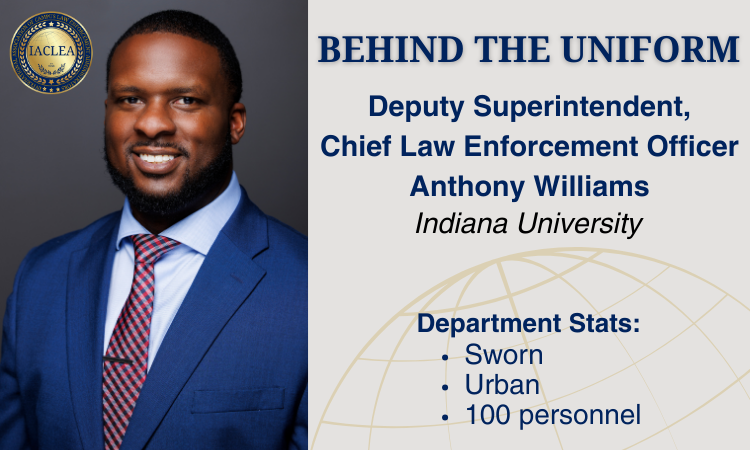
Chief Anthony Williams – Indiana University
Chief Anthony Williams’ journey into campus law enforcement began as a student security officer at Northwest Missouri State University Police Department (NWMSU PD). What started as a semester job quickly evolved into a calling. Working alongside certified officers, Chief Williams discovered that campus policing was more than enforcing rules—it was about building relationships, fostering trust, and ensuring students felt safe and valued. Encouraged by his supervisor, Lt. Mike Ceperley, he paused his studies to attend the police academy, determined to return to NWMSU PD. That decision launched a 15-year career filled with growth, mentorship, and impact.
At NWMSU PD, Chief Williams held a variety of roles including field training officer, department instructor, mental health liaison, and advisor to student organizations. His leadership was shaped by Dr. Clarence Green, whose mentorship helped Chief Williams develop a service-first mindset and seize opportunities that expanded his reach. While serving the department, Chief Williams earned degrees in Corporate Recreation and Wellness and Business Administration, and graduated from the FBI National Academy’s 278th class.
Now serving as Deputy Superintendent and Campus Chief Law Enforcement Officer at Indiana University Police Department, he oversees operations across nine campuses. His days are filled with strategic planning, collaboration, and reflection—anchored by a daily habit of asking himself key questions during his commute home to lead with clarity and purpose. He finds the most reward in connecting with students, changing perceptions, and being part of their personal and academic journeys. One standout moment was a playful photo skit mimicking sorority “big-little” poses that went viral, a reminder of how creativity and connection can reshape the narrative around law enforcement.
Chief Williams’ approach to leadership is grounded in vulnerability, authenticity, and a commitment to lifelong learning. He stays current through mentorship, professional networking, and collaboration with legal experts and training teams. His core values, curiosity, humility, commitment, and authenticity, guide his work and shape his impact. His mentors, including Dr. Green and Dr. Justin Mallett, provide daily insight and challenge him to grow, offering perspectives on leadership, inclusion, and service that sharpen his approach. He also prioritizes wellness, drawing strength from his family, especially his mother’s resilience, and from physical outlets like running, golf, and grounding techniques. His support system, both personal and professional, helps him manage the emotional toll of the job and stay focused on his purpose.
He believes law enforcement is at its best when it’s rooted in genuine care for the community. Chief Williams wishes more people understood that officers strive to be partners, not just authority figures—working to build safer, stronger, and more connected environments. His advice to new officers is to hold on to personal values, know your “why,” and find a department that aligns with your purpose. His proudest accomplishments aren’t titles or awards—they’re the quiet moments of impact, the relationships built, and the legacy of service he continues to shape.
Looking ahead, Chief Williams hopes to help law enforcement strengthen and uplift communities by focusing on trust, accountability, and economic development. He envisions a profession that grows with the needs of the community, setting higher standards while remaining grounded in service. His story is a testament to the power of mentorship, resilience, and staying true to one’s values—and his impact continues to shape the future of campus public safety.
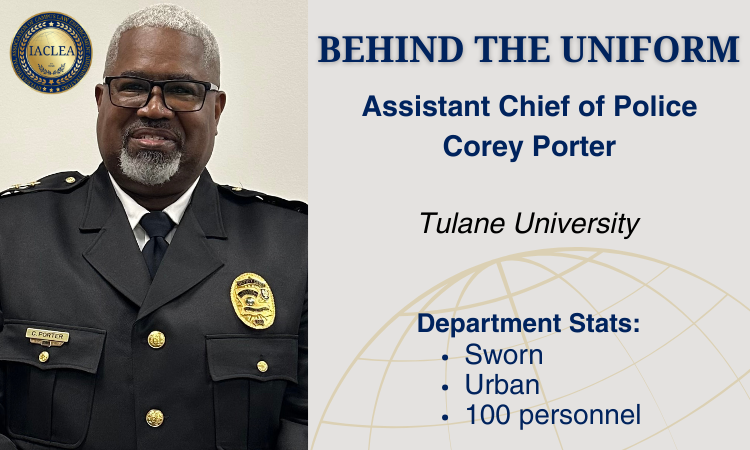
Assistant Chief Corey Porter – Tulane University
When Assistant Chief Corey Porter began his career in campus law enforcement, it was never just about enforcing rules—it was about mentorship, service, and building meaningful relationships. His passion for guiding young adults through critical stages of their lives remains the driving force behind his work today. For him, campus policing is a unique opportunity to connect with students, faculty, and staff in ways that foster trust, education, and long-term community impact.
His leadership style is rooted in mentorship, both for students and for younger officers. Assistant Chief Porter is committed to developing well-rounded professionals who balance accountability with compassion. He fosters a department culture that values service as much as safety, where officers are encouraged to grow through guidance, empathy, and integrity.
Community engagement is central to his philosophy. Assistant Chief Porter believes trust is built through consistent presence, open dialogue, and a genuine willingness to listen. Whether through partnerships with student groups or informal conversations on campus, he creates space for collaboration and shared responsibility in public safety. He also emphasizes the importance of treating every individual with fairness and dignity, ensuring that all members of the campus community feel seen, heard, and respected.
His values, grounded in faith, empathy, and purpose, guide every aspect of his work. He believes in helping someone every day and leads with transparency, accountability, and respect. He stays current through active involvement in professional organizations like IACLEA, IACP, and NOBLE, and shares what he learns to keep his team aligned with evolving best practices.
Looking ahead, Assistant Chief Porter aspires to lead his own department, one built on trust, transparency, and a mission rooted in service. He hopes to continue using his communication and relationship-building skills to make a lasting impact. For the profession as a whole, he envisions a future defined by stronger community partnerships, greater accountability, and a renewed focus on officer wellness and innovation. His ultimate goal is to help shape a department—and a profession—where service, trust, and humanity define the badge.
Assistant Chief Porter hopes more people will recognize that law enforcement is, at its core, a service profession. Officers are human beings, driven by a desire to help, solve problems, and do the right thing under pressure. He believes modern policing is about building relationships, preventing harm, and working collaboratively—not just enforcing laws. He hopes the public continues to see officers as partners, mentors, and problem-solvers committed to making a positive impact.
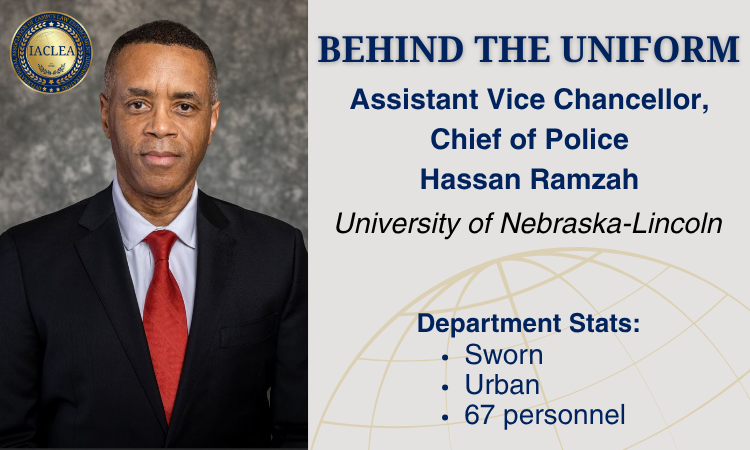
Chief Hassan Ramzah – University of Nebraska-Lincoln
Chief Hassan Ramzah’s journey into campus public safety began with a sense of purpose forged during his time in the Army, where he served in a military police unit. While earning his college degree, he envisioned a future in policing, recognizing the natural alignment between the paramilitary nature of law enforcement and his military background. His career began in municipal policing, but his experiences as a college student and later as an adjunct instructor ignited a passion for higher education environments—places where safety and learning intersect. This passion ultimately led him to transition into campus public safety, where he could make a meaningful impact on students, faculty, and staff.
For Chief Ramzah, community engagement is not a checkbox, it’s a philosophy. He approaches it from multiple angles, starting with visibility and participation in campus life. Whether attending public events or reaching out to organizers of smaller gatherings, he ensures that his presence is felt and his support is clear. These moments of connection often open doors to deeper dialogue and engagement. Beyond events, he believes in creating structured opportunities for ongoing conversations about safety and policing, such as through advisory boards that foster collaboration and transparency. At the heart of his approach is active listening and genuine partnership—working alongside students, faculty, and staff to address concerns in ways that benefit the entire community.
Serving the community, to him, means full commitment, investing time, energy, and resources to create a safer, more inclusive campus environment. It’s about identifying concerns, resolving them with lasting solutions, and advocating for those who may not have a voice. His leadership reflects this belief, blending accountability with empathy and ensuring that every interaction builds trust and understanding.
Chief Ramzah is also deeply committed to professional growth. He continuously seeks opportunities to expand his knowledge through training conferences and e-learning. Recently, he became a Master Trainer through the National Threat Evaluation & Reporting (NTER) Master Training Program, adding to his expertise in threat assessment and prevention. He also remains actively engaged with IACLEA conferences, staying current on trends and best practices that shape the future of campus safety.
Outside of work, he values balance and renewal. Traveling to new places fuels his curiosity, while regular exercise provides a healthy outlet for stress.
For Chief Ramzah, campus public safety is more than a profession; it’s a calling rooted in service, trust, and collaboration. His journey from military service to municipal policing to higher education reflects a lifelong commitment to protecting and empowering communities, ensuring that every campus he serves is a place where people feel safe, supported, and heard.
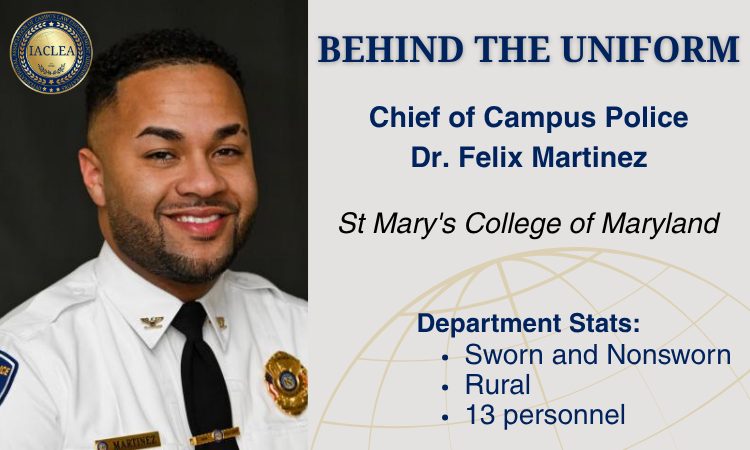
Chief Felix Martinez – St Mary’s College of Maryland
Chief Martinez’s journey into campus law enforcement began in Jamaica, Queens, New York, where he grew up witnessing the devastating impact of violence. After losing someone close to him to gun violence, he committed himself to becoming part of the solution—creating safer environments and preventing others from experiencing similar pain.
He entered the field at age 19 as a Campus Security Assistant at Borough of Manhattan Community College, later advancing to roles at City College and Queensborough Community College. His experience spans dispatch operations, training, and community engagement, including work with the NYC Department of Probation and as a Correctional Officer in Maryland. His leadership continued to evolve at Johns Hopkins University and the Riverdale Park Police Department, where he focused on juvenile outreach and community engagement.
Now serving as Chief of Campus Police at St. Mary’s College of Maryland, Chief Martinez leads a hybrid department of armed and unarmed officers. Under his leadership, the department has expanded community engagement, improved campus infrastructure, and implemented strategic changes to staffing and operations. He also secured a campus safety grant to further enhance services.
Chief Martinez holds a Doctorate in Educational Leadership from Trident University, with a dissertation on community policing in Latino communities. He also earned a Master’s in Homeland Security and Criminal Justice Leadership from St. John’s University and is a graduate of the Northwestern University School of Police Staff and Command.
What drives him most is the belief that “the police are the community, and the community is the police.” He emphasizes that safety is a shared responsibility and urges people to look beyond the uniform: “My uniform pays the bills, my character is who I am—so judge me by my character, not my uniform.” For Chief Martinez, building trust starts with genuine connection and shared experiences.
Looking ahead, Chief Martinez hopes to become a Vice President of Campus Safety, where he can lead on a broader scale and integrate public safety as a collaborative partner across campus departments. He also advocates for a transformation in law enforcement training—one that prioritizes communication, cultural competence, emotional intelligence, and community engagement.
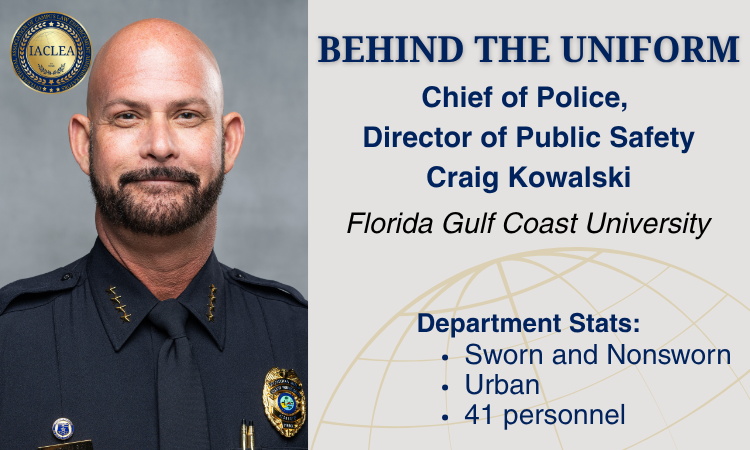
Chief Craig Kowalski – Florida Gulf Coast University
Chief Craig Kowalski’s dedication to campus public safety began early in his career as a School Resource Officer, where he saw firsthand how a secure environment empowers students to learn and grow. “It wasn’t just about enforcing laws,” he reflects. “It was about being a trusted presence, building relationships, and guiding young people through challenges.” That foundational experience shaped his belief that public safety in education is as much about mentorship and prevention as it is about response.
His law enforcement journey began in 1991 with the City of Parkland, where he served in multiple roles including detective and school resource officer. He later earned an associate’s and bachelor’s degree in criminal justice, followed by a master’s in public administration, strengthening his leadership and operational expertise.
In 2001, Chief Kowalski joined Broward County Public Schools, ultimately serving as Chief of Police and overseeing safety for more than 266,000 students. One of the most transformative moments in his career came when he led the Special Investigative Unit following the tragedy at Marjory Stoneman Douglas High School. That experience deepened his commitment to proactive, compassionate public safety and continues to guide his leadership today.
Now serving as Chief of Police and Director of Public Safety at Florida Gulf Coast University, Chief Kowalski applies decades of experience to foster a safe, supportive campus environment. He finds the greatest reward in building partnerships and seeing the positive impact of proactive safety measures on the campus community.
Staying current is a priority for Chief Kowalski. He regularly attends law enforcement conferences, workshops, and continuing education programs, and maintains strong relationships with local, state, and federal partners. He believes in not only following best practices but creating them—encouraging innovation and continuous improvement within his team.
Community engagement is central to his approach. Whether mentoring youth or collaborating with campus partners, Chief Kowalski emphasizes visibility, transparency, and shared responsibility. “Public safety is not just a department’s job—it’s a community commitment.”
Inspired by his father, a former police chief, Chief Kowalski leads with integrity, humility, and a deep sense of service. Looking ahead, he plans to pursue a doctoral degree in educational leadership to further explore how leadership principles can strengthen public safety and campus environments.
Chief Kowalski’s career reflects a steadfast commitment to protecting and empowering the next generation—through leadership, collaboration, and a deep belief in the power of safe learning spaces.
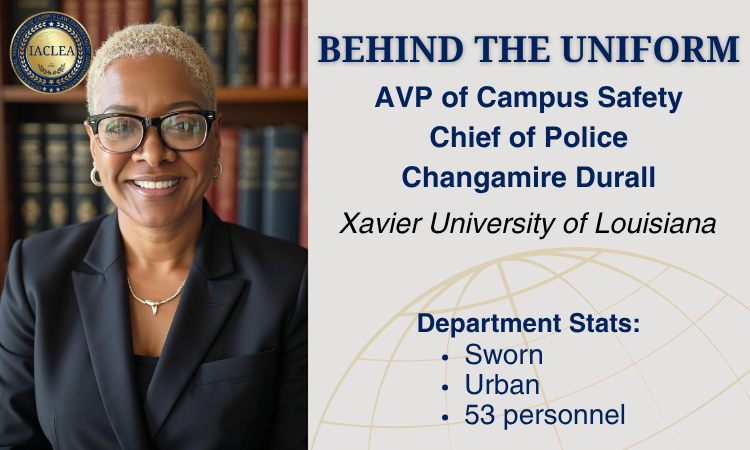
Chief Changamire Durall – Xavier University of Louisiana
Chief Changamire Durall’s passion for law enforcement began early, inspired by her father’s career and a strong sense of duty to serve. Guided by values of justice, integrity, and leadership, she pursued a path that would allow her to make a meaningful impact on her community. Witnessing the transformative power of compassionate policing reinforced Chief Durall’s commitment to creating safe, inclusive environments.
Chief Durall’s career spans 27 years, beginning at the sheriff’s office and later earning a bachelor’s degree in criminal justice. After joining a university police department, Chief Durall completed rigorous academy training and advanced through roles including Patrol Officer, Night Shift Sergeant, and Admin and Investigations Lieutenant. Each position strengthened her expertise in crisis intervention, emergency preparedness, and strategic planning, ultimately leading to her current role as Chief of Police.
In her leadership role, Chief Durall oversees all aspects of campus safety, from policy development and stakeholder engagement to emergency response and officer training. She prioritizes visibility and approachability on campus, fostering trust and collaboration with students, faculty, and staff. Her focus remains on creating a secure environment where learning and growth can thrive.
Integrity and professionalism guide Chief Durall’s approach to even the most challenging situations. She leads by example, maintaining transparency, accountability, and open communication. By emphasizing ethical standards and fairness, she sets the tone for her department and builds trust within the campus community.
Continuous learning is central to her leadership philosophy. Chief Durall stays current through professional development, conferences, and active participation in law enforcement associations. She encourages her team to pursue specialized training and certifications, fostering a culture of growth and adaptability. Her commitment ensures that her department remains prepared for evolving challenges, from cybersecurity threats to mental health crises.
Outside of work, Chief Durall values balance and wellness. She enjoys going to the gym, massages for relaxation, and traveling to recharge and gain fresh perspectives. Chief Durall encourages aspiring officers to stay true to themselves and lead with resilience, integrity, and compassion. She emphasizes the importance of building trust within diverse communities, seeking mentorship, and remaining adaptable through continuous professional development.
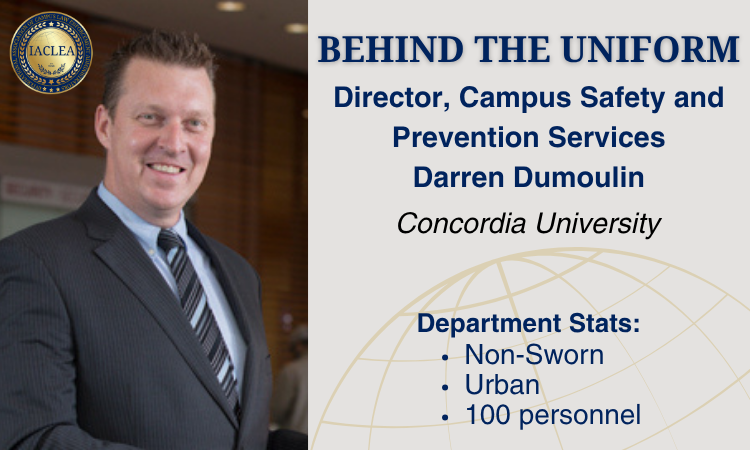
Director Darren Dumoulin – Concordia University
What started as a short-term job in campus safety turned into a lifelong career for Director Dumoulin. When he first joined Concordia, he thought the role would be temporary. Instead, it became the foundation for a journey that would span decades and multiple disciplines.
He began as a campus safety officer and steadily worked his way up—first as a supervisor, then lieutenant, and eventually operations manager. At the same time, he served as a part-time firefighter, a role that would later shape the next chapter of his career.
That firefighting experience opened the door to a new opportunity: the university’s first emergency manager position. He accepted the challenge and built an emergency management program from the ground up, incorporating fire prevention and HAZMAT response. For several years, he focused on emergency preparedness before returning to campus safety as assistant director. At that point, he made a pivotal decision—to fully commit to campus safety and close the chapter on his firefighting career.
Today, as director, his role is to support a team of approximately 120 professionals who serve in uniform operations, dispatch, fire prevention, emergency management, investigations, and support services. His job is to remove roadblocks and advocate for the work his team does every day to protect the university community.
One of the greatest challenges he faces is bridging the gap between unrealistic expectations and the realities of resources, legal limitations, and the belief that every situation can be resolved through de-escalation. While that can be frustrating, it’s also deeply rewarding when he helps community members understand the unseen work his department does—and even turns skeptics into supporters.
There are moments that remind him why the work matters. One that stands out happened during a convocation ceremony. As students filed into the auditorium, one stepped out of line to shake his hand and thank him, saying that without his help, she wouldn’t be graduating. He didn’t remember the details, but the gesture reinforced a powerful truth: people may forget your name, yet they never forget how you made them feel—especially in moments of distress.
For Director Dumoulin, serving the community means being kind, consistent, impartial, and transparent, while going the extra mile. He often tells new recruits that when someone asks for directions, don’t just point—walk them there. Small gestures like that create lasting connections and build trust.
Integrity and professionalism, especially in difficult situations, come from teamwork. Over the past two years, his team has faced many challenges, but their ability to support one another has been critical. Knowing someone will step in when you’re not at your best makes all the difference.
Staying current is another priority. Membership in IACLEA helps him keep pace with evolving best practices, and innovation is part of his department’s mission. He believes that being the best means constantly questioning and improving practices and training.
Managing the emotional toll of the job is easier thanks to a wonderful and understanding partner who helps him pivot during tough times. Looking ahead, his goal is simple: to position the department and his leadership team for success and ensure a smooth transition when he retires.
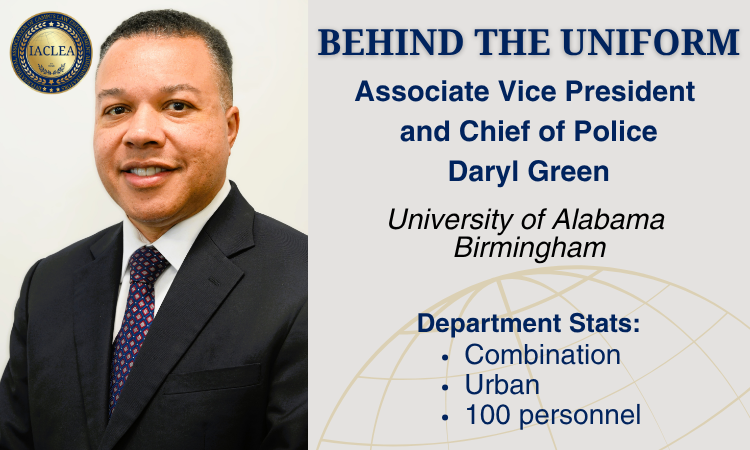
Chief Daryl Green – University of Alabama Birmingham
Chief Green’s journey in campus law enforcement is driven by a deep sense of purpose. He views campus policing as far more than enforcement; it’s an integrated partnership within a dynamic educational community. Community-oriented policing anchors his philosophy. Officers are first responders, yes—but also educators, mentors, and problem-solvers who build trust through direct engagement. Collaboration is central to his approach, working alongside mental health services, athletics, transportation, academia, and student affairs to provide holistic support and address issues before they escalate.
The scale and complexity of UAB heighten the responsibility. Chief Green partners closely with leaders across the UAB Health System, the fourth-largest public health system in the country, to manage a wide array of issues that affect both campus and the broader community. Given the size and interconnectedness of the university and health system, campus issues can ripple into the City of Birmingham. To ensure a coordinated public safety strategy, he engages regularly with city leadership, aligning university, health system, and municipal efforts to safeguard the community.
Balancing safety with the culture of academia is among his greatest challenges. Chief Green strives to protect an open, welcoming environment without making campus feel like a fortress. UAB’s status as a major research institution—with multiple biocontainment laboratories—and its integration with a large public health system add further complexity, requiring unified planning and constant collaboration at every level.
Professional growth and rigorous standards shape Chief Green’s leadership. He is a graduate of the FBI National Academy, the Senior Management Institute for Police at the University of Boston, and the Michigan State University School of Staff and Command. Under his direction, the department maintains accreditations with IACLEA, continually reviewing policies to meet top industry standards. He remains actively engaged in the field through weekly participation in the Domestic Preparedness Committee, ongoing IACLEA training on campus-specific issues, and regular monitoring of IACLEA’s “Connections” to stay current on trends and best practices. Internally, he prioritizes officer wellness—promoting peer support, encouraging candid check-ins, and connecting personnel to university counseling resources—because resilience, he believes, is a collective effort.
For those considering a career in law enforcement, Chief Green’s guidance is straightforward: commit to continuous education and build a strong support system. The work can be emotionally taxing, making family, friends, and trusted colleagues essential to well-being and a long, successful career.
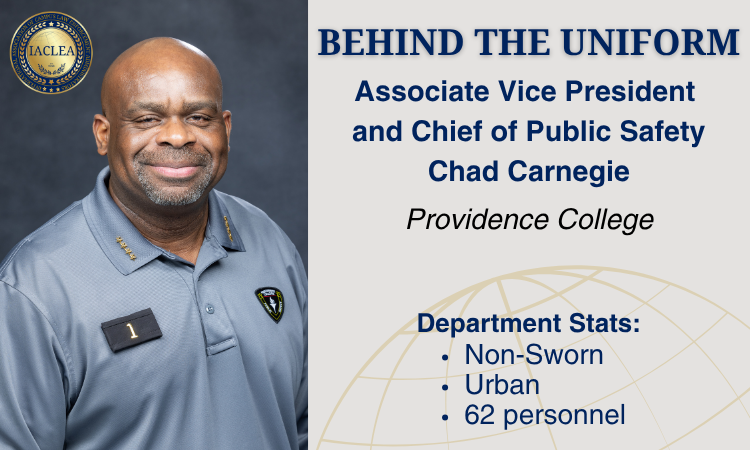
Associate Vice President Chad Carnegie – Providence College
AVP Carnegie’s career in law enforcement spans more than two decades, marked by a commitment to public safety and a passion for serving diverse communities. His journey began in a municipal law enforcement agency in Florida, where he dedicated eleven years to protecting and serving the public. Seeking a new challenge and an opportunity to work in a dynamic academic environment, he transitioned to campus law enforcement. This move opened the door to another eleven years of service at Georgetown University, where he gained extensive experience in addressing the unique safety needs of higher education institutions. Today, he brings that wealth of knowledge and leadership to Providence College.
In his current role, he focuses on creating a safe and secure environment for students, faculty, and staff. Campus safety is a complex and evolving responsibility, influenced by factors such as social media, mental health concerns, external threats, and First Amendment challenges. These issues require constant vigilance and adaptability to ensure the well-being of the campus community. He approaches these challenges with a proactive mindset, emphasizing prevention and preparedness as essential components of effective public safety.
His leadership is guided by core values that have shaped his career from the beginning. Humility, honesty, hard work, and leading by example are central to his philosophy. He also places great importance on remembering his roots, having worked his way up from an officer to his current position as chief. These principles inform every decision he makes and every interaction he has, reinforcing trust and accountability within the community he serves.
Professional development remains a priority for AVP Carnegie, as staying informed is critical in a field that changes rapidly. He regularly attends specialized training programs offered by organizations such as the Secret Service, FEMA, and IACLEA conferences. These opportunities allow him to stay current with best practices, emerging threats, and innovative strategies for campus safety.
The emotional demands of his role are significant, but AVP Carnegie has developed healthy ways to manage stress and maintain balance. When faced with difficult situations or challenging days, he takes time to walk the campus, visit the bookstore, and engage with students and staff. These moments of connection not only help him decompress but also strengthen relationships within the campus community. Outside of work, he turns to sports and travel as outlets for relaxation and renewal, ensuring he remains energized and ready to meet the demands of his position.
Looking ahead, AVP Carnegie’s primary goal is unwavering: to keep the Providence College community safe from major incidents. He approaches this responsibility with a deep sense of care, treating students as if they were his own and prioritizing their safety above all else. His dedication reflects a lifelong commitment to public service and a belief that campus law enforcement plays a vital role in fostering an environment where education and personal growth can thrive.
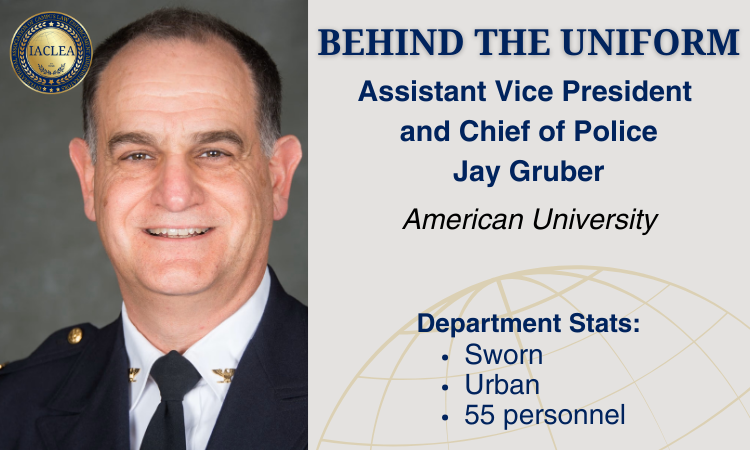
Chief Jay Gruber – American University
Chief Gruber’s journey into campus law enforcement began with a simple desire to serve. After earning a degree in Criminal Justice, he was open to any law enforcement opportunity. The University of Maryland, College Park Police Department offered him his first position, and what he thought would be a short-term role turned into a 26-year career. The dynamic environment of a college campus, with its unique challenges and opportunities, drew him in and shaped his professional path.
Starting as a patrol officer, Chief Gruber quickly discovered the freedom and responsibility that came with the role. His early years were marked by criminal arrests, traffic enforcement, and community engagement. Over time, his interest in connecting with the campus community deepened, leading him to develop programs that fostered safety and awareness. His commitment to proactive engagement became a defining feature of his leadership style.
As he advanced through the ranks, Chief Gruber focused on critical issues such as underage drinking and DUI enforcement, while also honing his skills in grant writing. The events of 9/11 and a devastating tornado on campus shifted his trajectory toward emergency management. He spearheaded the university’s first emergency management initiatives, laying the groundwork for comprehensive preparedness. Along the way, he earned a master’s degree in applied management and a graduate certificate in homeland security management, reinforcing his expertise in public safety leadership.
Chief Gruber’s career spans nearly four decades in higher education law enforcement. After retiring as Assistant Chief of Police at the University of Maryland, he became Chief of Police at Georgetown University, later rising to Associate Vice President of Public Safety. His responsibilities expanded to include police operations, emergency management, and international safety and security. Upon retiring from Georgetown, he assumed his current role as Assistant Vice President for Police, Emergency Management, and Transportation, and Chief of Police at American University.
In his current position, Chief Gruber oversees a wide range of responsibilities, from daily police operations to campus emergency preparedness. His background in physical security and communications systems has been instrumental in strengthening infrastructure. He also manages transportation and parking operations, adding new dimensions to his leadership portfolio. Despite the administrative demands, he prioritizes engagement with his officers and the broader university community, believing that trust and collaboration are essential to effective policing.
Throughout his career, Chief Gruber has faced challenges such as recruiting qualified personnel, maintaining budgets, and keeping pace with evolving technology. Yet, his approach remains rooted in servant leadership. He views serving the community as a sacred duty—meeting people where they are, understanding their needs, and ensuring the police department is woven into the fabric of campus life. His values of selflessness and service have guided him through every stage of his career.
Outside of work, Chief Gruber finds balance through volunteer service and personal passions. He continues to serve his community as a rescue squad volunteer, enjoys restoring and driving classic cars, and shares a love of travel with his wife. These pursuits provide a welcome counterpoint to the demands of his role, reflecting a lifelong commitment to service and a zest for life beyond the uniform.
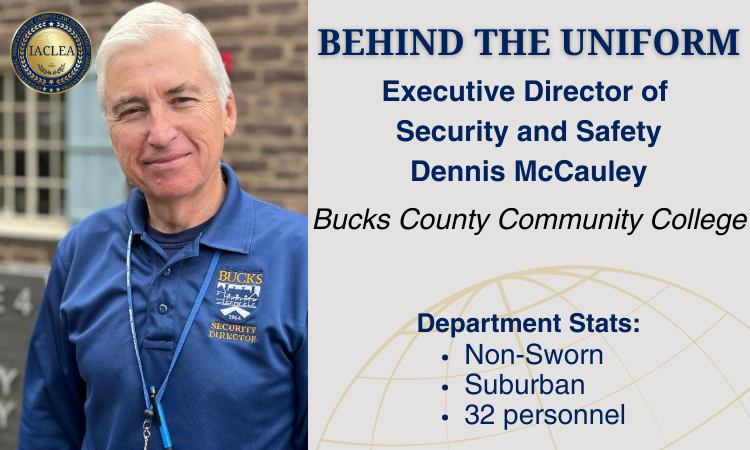
Executive Director Dennis McCauley – Bucks County Community College
After retiring from a distinguished career in municipal policing, Executive Director McCauley sought a role where his experience could make a meaningful impact. His interest in higher education and commitment to public safety led him to campus law enforcement, a field that requires leaders who can work collaboratively with diverse groups of students, faculty, and staff to foster a culture of safety.
His law enforcement journey began with the Abington Police Department in Montgomery County, Pennsylvania, where he served for 27 years. Starting as a patrol officer, he advanced through roles as detective, patrol sergeant, and leader of the Special Investigations Unit. Later, he commanded the Community Policing and Administrative Services Divisions, gaining extensive experience in both operational and strategic leadership. During this time, he earned a master’s degree in Criminal Justice Administration from Villanova University, further strengthening his expertise.
In 2009, McCauley joined Bucks County Community College as Executive Director of Security and Safety. His mandate was clear: modernize campus safety operations, build strong partnerships with local law enforcement, and enhance relationships within the college community. Over the past 16 years, he has overseen significant advancements in security technology, improved training and professionalism among staff, and cultivated a culture of transparency and trust.
Today, his role is dynamic and multifaceted. He manages daily operations while engaging with students, faculty, and staff to address safety concerns. McCauley emphasizes a community policing approach, ensuring his team is approachable and integrated into campus life. This philosophy has helped build confidence and mutual respect between the safety department and the college community.
One of the most memorable milestones of his tenure was achieving IACLEA Accreditation in 2024, a rigorous, multi-year process that elevated the department’s standards and effectiveness. This accomplishment reflects his dedication to continuous improvement and his belief that campus safety must evolve to meet modern challenges.
McCauley’s work is guided by core values of ethics, integrity, service, and professionalism. He understands the growing concerns about campus violence and addresses them through a comprehensive strategy that combines planning, technology, prevention, and threat assessment. His goal is not only to deter incidents but also to reassure the community that their safety is a top priority.
Outside of work, McCauley enjoys spending time with his wife, Sheilagh, and their family. Becoming a grandparent has been a special joy, and he also finds relaxation in cheering for his beloved Philadelphia Eagles. His advice to those considering a career in law enforcement is simple yet profound: approach it as a commitment to helping others and serving with integrity, not just as a job.
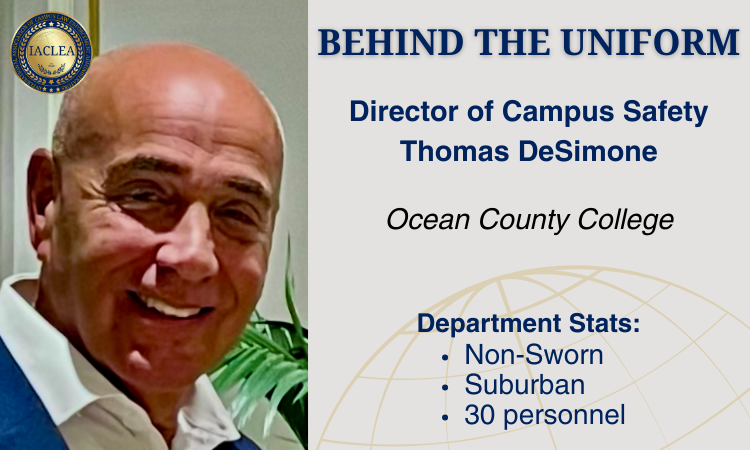
Director Thomas DeSimone – Ocean County College
Thomas DeSimone’s career in campus public safety is driven by a commitment to creating secure, supportive environments where students, faculty, and staff can thrive. He believes safety is the foundation of a successful learning community and was inspired by the opportunity to combine proactive prevention, community engagement, and leadership in service of education.
With 40 years of law enforcement experience, Director DeSimone began as a patrolman with the Plainsboro Police Department in New Jersey, later serving as a detective and advancing into supervisory roles, including Tactical Commander for SWAT for twelve years. Rising to Lieutenant, he held command positions across Patrol, Special Services, Administrative, and Internal Affairs, gaining broad operational expertise. His academic achievements—a Bachelor’s degree in Political Science and a Master’s degree in Administrative Science—strengthened his leadership and management capabilities.
Today, as Director of Campus Safety, he oversees personnel, security infrastructure, and critical communications while ensuring alignment with institutional goals and accreditation standards. His responsibilities include policy review, training initiatives, and collaboration with campus and local law enforcement partners, all focused on maintaining a safe, welcoming learning environment.
One of his proudest achievements was leading the department to IACLEA accreditation, meeting all 220 professional standards. This milestone represented years of preparation, policy review, and teamwork, and stands as a defining accomplishment that elevated departmental credibility and reinforced a culture of accountability and excellence.
Director DeSimone’s work is guided by core values: professionalism, integrity, respect, and compassion. These principles shape every interaction and decision, ensuring fairness, transparency, and empathy. For him, serving the community means building trust, solving problems, and creating an environment where people feel supported and valued.
Continuous learning is central to his leadership. He stays current with laws, procedures, and best practices through professional development, accreditation workshops, and collaboration with local, state, and federal partners. His advanced education and certification as a Certified Public Manager provide the tools to lead with clarity, purpose, and innovation.
Outside of work, he prioritizes family and well-being, spending time with his wife, children, and grandchildren, maintaining fitness routines, and enjoying golf. Looking ahead, his goals include enhancing technology, expanding professional development for staff, and deepening partnerships to ensure the department remains a model of professionalism and innovation in campus public safety.
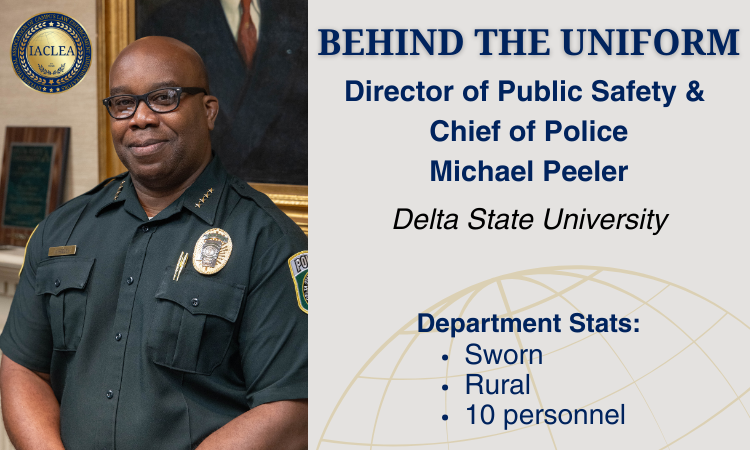
Chief Michael Peeler – Delta State University
Chief Michael Peeler’s career in public safety is rooted in a lifelong commitment to service. After retiring as a Lieutenant Colonel from the U.S. Army, where he served nearly 28 years in distinguished units such as the 82nd Airborne Division at Fort Bragg and the 101st Airborne Division (Air Assault) at Fort Campbell, he sought a way to continue serving his community. His passion for helping others inspired him to transition into law enforcement, where he could make a direct impact on the lives of those around him.
Peeler began his law enforcement journey as a sworn patrol officer with the Springfield Police Department in middle Tennessee. He later served as a patrol deputy with the Cheatham County Sheriff’s Office, gaining valuable experience in community policing and public safety operations. His leadership skills and dedication led to his appointment as the inaugural Chief of the Dyersburg State Community College Police Department, where he spent three years building the foundation for campus safety.
Today, Chief Peeler serves as the Director of Public Safety and Chief of Police at Delta State University. In this role, he prioritizes engagement with students, faculty, and staff, finding these daily interactions to be the most rewarding aspect of his work. His approach to building trust centers on being present and intentional—whether through meetings with student organizations, participation in orientations, or collaboration with faculty and staff groups.
Throughout his career, Chief Peeler has faced significant challenges, including establishing effective communication channels for emergency protocols across campus and local communities. Despite these obstacles, he remains committed to fostering a safe and informed environment. His leadership is guided by the U.S. Army’s core values—Loyalty, Duty, Respect, Selfless Service, Honor, Integrity, and Personal Courage—which continue to shape his decisions and actions.
Chief Peeler is also deeply invested in professional development. He has completed basic, advanced, and train-the-trainer levels of Crisis Intervention Team (CIT) training and regularly attends law enforcement conferences to stay current on best practices. Looking ahead, his goals include earning a doctoral degree and becoming a consultant and advocate for law enforcement professionals, further extending his impact on the field.
Outside of work, Chief Peeler maintains balance through early morning workouts and quality time with his spouse of nearly 30 years. He also enjoys reading fiction as a way to unwind. His dedication to service—whether to his country, his community, or his profession—defines his career and continues to inspire those around him.
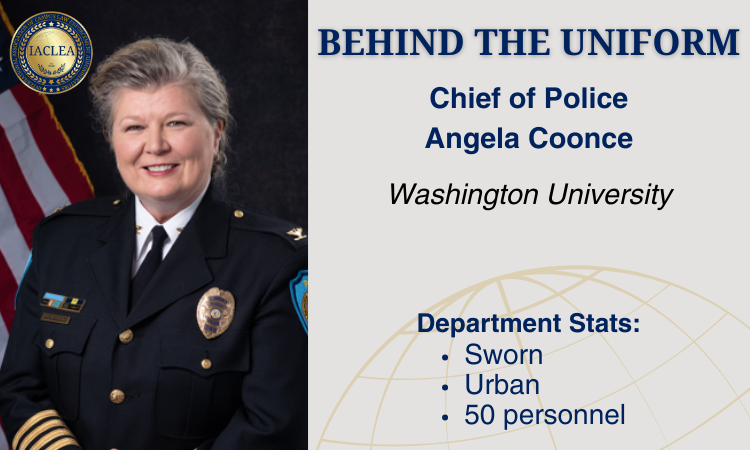
Chief Angela Coonce – Washington University
Chief Coonce’s journey into law enforcement began with a desire to make a meaningful impact. After college, she worked in marketing for a large company in St. Louis City, but the role left her searching for a deeper sense of purpose. In 1998, she answered that calling by joining the St. Louis Metropolitan Police Department, believing this path would allow her to serve her community in a profound way.
Over 24 years with the St. Louis City Police Department, Chief Coonce rose through the ranks, serving in roles such as Community Liaison, Problem Property Officer, Intelligence Detective, and Aide to the Chief of Police. She broke barriers as the first female Commander of both the Crime Lab and the Intelligence Division. Among her proudest achievements was designing and launching the city’s first Real-Time Crime Center and implementing a comprehensive camera and license plate reader program to combat violent crime. Later, as Major over the North Patrol Division, she oversaw two of the city’s most demanding districts—a role that tested her resilience and strategic vision.
In August 2022, Chief Coonce retired from St. Louis City PD and joined the Washington University Police Department (WashU PD) as Chief of Police—a position she considers her dream job. WashU’s commitment to the region, captured in its mantra “In St. Louis, For St. Louis,” deeply resonated with her values. Leading a team of 50 sworn officers on an urban campus of 16,000 students, Chief Coonce views campus policing as uniquely rewarding, offering opportunities to build trust and foster safety in a vibrant academic environment.
Community engagement is at the heart of her leadership. Chief Coonce and her team organize events that allow students, faculty, and staff to see the person behind the uniform—whether through kickball games with international students, BBQs during move-in, or holiday celebrations. In 2023, she introduced the Comfort Dog Program featuring K9 Brookie and K9 Bear, which has had a profound impact on mental health and wellness across campus.
Her dedication to education and professional development underscores her success. Chief Coonce earned a Bachelor of Science in Urban Studies from Harris-Stowe State University, where she also played college basketball. She later obtained a Master of Arts in Management and Leadership from Webster University and a Master of Arts in Security Studies from the Naval Postgraduate School – Center for Homeland Defense and Security. She is a graduate of the FBI National Academy and the Police Executive Research Forum’s Senior Management Institute for Police, and she holds a certificate in Diversity, Equity, and Inclusion in the Workplace.
Chief Coonce hopes more people understand the complexities of law enforcement—the unpredictability of each call, the emotional toll, and the courage required to serve. Her advice to those considering a career in law enforcement is to embrace the journey, remain adaptable, and commit to continuous learning. From her first day in uniform to her current role as Chief of Police at WashU, Chief Coonce’s career reflects a steadfast dedication to service, innovation, and community—a legacy that continues to inspire those around her.
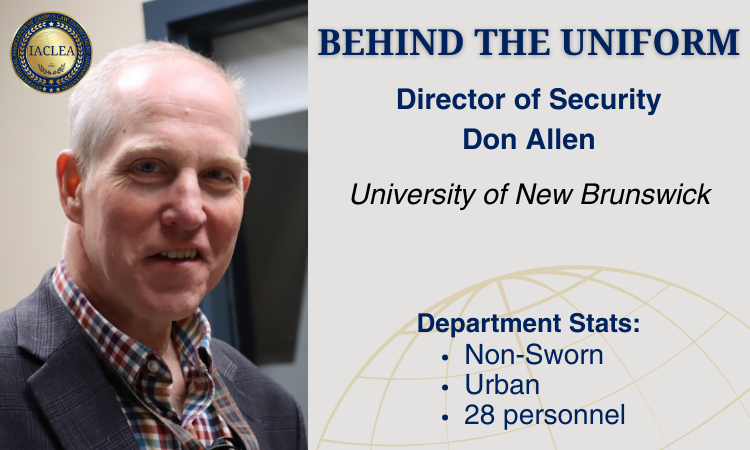
Director Don Allen – University of New Brunswick
Director Allen serves as the Director of Security at the University of New Brunswick, where he leads a non‑sworn team of 28 professionals across two campuses and an off‑site location. With nearly 36 years in policing and campus public safety, he brings extensive experience to creating a safe, supportive environment for students and the wider university community.
His path into public safety began early, shaped by family influences and a long-standing desire to help others. After earning a sociology degree from Dalhousie University, he joined the Royal Canadian Mounted Police in 1990 and went on to serve in communities across eastern Canada, including rural posts and a remote Inuit community. Over his 27‑year RCMP career, he advanced through multiple leadership roles, managed large public‑order events, responded to crisis situations, and retired as a Superintendent before transitioning to campus security in 2017.
At UNB, he focuses on strategic planning, emergency preparedness, complex investigations, and supporting students who may be struggling with the adjustment to university life. He finds great fulfillment in helping individuals regain their footing and reconnect with their academic goals. One of his most meaningful accomplishments has been integrating the Fredericton and Saint John security offices into a unified operation, strengthening communication, shared practices, and the sense of team identity that he values deeply.
Throughout his career, Director Allen has emphasized authenticity, professionalism, and respect as essential to building trust—especially within a diverse, international student population. He has pursued training in psychologically safe leadership and advanced emergency management to strengthen his ability to guide his staff. Staying informed is equally important to him; he remains connected to local law enforcement partners, leverages IACLEA resources, and collaborates frequently with colleagues nationwide to exchange knowledge and problem‑solve shared challenges.
He is also mindful of the emotional demands of long-term service. His resilience is supported by both experience and a strong personal network, and he finds campus public safety a refreshing change from the intensity of armed policing. He approaches leadership with the understanding that character, consistency, and professionalism shape how communities perceive and trust public safety teams.
Outside of work, Director Allen maintains balance through outdoor activities such as walking, swimming, kayaking, cross‑country skiing, and snowshoeing, along with time spent with family and tending to yard work. As he approaches his second retirement in June 2026, he looks forward to relaxing, traveling, and embracing a new chapter after a long and impactful career devoted to community safety and service.
